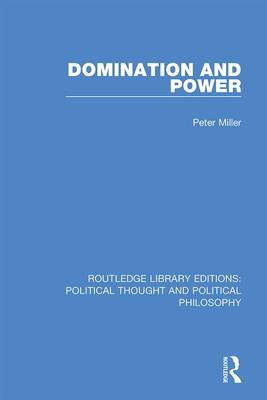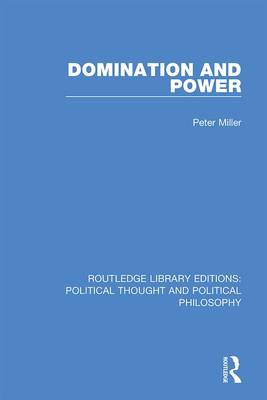
- Retrait gratuit dans votre magasin Club
- 7.000.000 titres dans notre catalogue
- Payer en toute sécurité
- Toujours un magasin près de chez vous
- Retrait gratuit dans votre magasin Club
- 7.000.0000 titres dans notre catalogue
- Payer en toute sécurité
- Toujours un magasin près de chez vous
Domination and Power
Peter MillerDescription
First published in 1987. Our understanding of the nature of power in western societies is currently undergoing a major reassessment. The significance of this reassessment emerges forcefully through comparing the writings of the principal exponents of Critical Theory - Max Horkheimer, Herbert Marcuse and Jürgen Habermas - with those of Michel Foucault. Peter Miller suggests that these two traditions embody fundamentally distinct philosophical and sociological principles. He grounds his analysis in the concepts of domination (Critical Theory) and power (Foucault).
Miller identifies the notion of subjectivity as central to a differentiation of the respective approaches of Critical Theory and Foucault. For Critical Theory it is the repression of subjectivity which provides the evidence of domination and the rationale for its critique, while for Foucault subjectivity in western societies is fabricated through power and linked to the deployment of specific knowledges. Miller shows that despite the achievements of Critical Theory in bringing to light the repressive nature of advanced industrial societies, its thinking is inadequate as a basis for future analysis and critique. He argues that Foucault's genealogy of the modern subject, which highlights the role of the human sciences in its fabrication, is a more fruitful basis for charting and investigating the mode of operation of contemporary forms of power.
The book includes a survey of all published works by Foucault, up to the time of his death in 1984, and commentaries on the writings of Max Horkheimer, Herbert Marcuse and Jürgen Habermas.
Spécifications
Parties prenantes
- Auteur(s) :
- Editeur:
Contenu
- Nombre de pages :
- 282
- Langue:
- Anglais
- Collection :
- Tome:
- n° 41
Caractéristiques
- EAN:
- 9780367253936
- Date de parution :
- 04-12-19
- Format:
- Livre relié
- Format numérique:
- Genaaid
- Dimensions :
- 156 mm x 233 mm
- Poids :
- 459 g

Les avis
Nous publions uniquement les avis qui respectent les conditions requises. Consultez nos conditions pour les avis.






